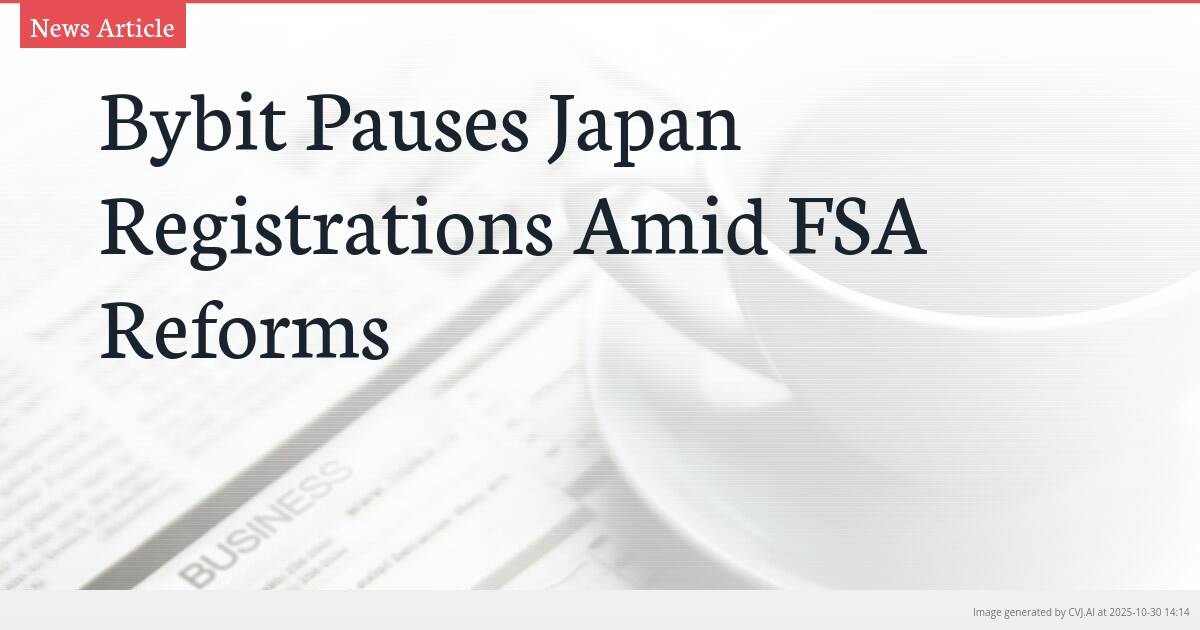This summary text is fully AI-generated and may therefore contain errors or be incomplete.
Introduction
Bybit, the world’s second-largest cryptocurrency exchange by trading volume, has announced it will suspend new user registrations in Japan effective October 31, 2023. This strategic pause comes as the exchange positions itself to align with Japan’s evolving regulatory landscape, where the Financial Services Agency is considering groundbreaking reforms that could allow traditional banks to hold Bitcoin and operate licensed cryptocurrency exchanges.
Key Points
- Bybit will stop accepting new Japanese users from October 31, 2023
- Japan's FSA is considering reforms to allow banks to hold Bitcoin and operate exchanges
- The exchange describes this as a proactive compliance measure with local regulations
Strategic Compliance in a Shifting Regulatory Environment
Bybit’s decision to halt new user registrations in Japan represents a calculated response to the country’s rapidly changing digital asset regulations. The exchange, which ranks as the second-largest globally by trading volume, described this move as part of its ‘proactive approach’ to compliance with Japan’s emerging regulatory framework. In its official announcement, Bybit emphasized its ‘commitment to operate responsibly and in compliance with local laws and regulatory expectations,’ signaling a strategic shift toward regulatory alignment rather than market expansion.
The timing of this decision coincides with significant regulatory developments from Japan’s Financial Services Agency (FSA), which is actively considering reforms that could fundamentally reshape the country’s cryptocurrency landscape. Bybit’s pause on new registrations suggests the exchange anticipates substantial regulatory changes that may require significant operational adjustments. This approach contrasts with the more aggressive expansion strategies seen in less regulated markets, highlighting the exchange’s recognition of Japan’s stringent regulatory environment.
Japan's Regulatory Evolution and Banking Sector Implications
The potential FSA reforms under consideration represent a landmark shift in Japan’s approach to digital assets. Most notably, the regulatory body is exploring measures that would allow traditional banks to hold Bitcoin directly and operate licensed cryptocurrency exchanges. This development could bridge the gap between traditional finance and digital assets, potentially bringing significant institutional capital and credibility to Japan’s cryptocurrency market.
For Japanese banks, these reforms could open new revenue streams and diversification opportunities while requiring substantial infrastructure investments and risk management frameworks. The integration of traditional banking with cryptocurrency operations would mark a significant departure from Japan’s previously cautious stance toward digital assets. The FSA’s consideration of such reforms indicates a maturation in regulatory thinking, acknowledging both the risks and opportunities presented by cryptocurrencies like Bitcoin.
This regulatory evolution follows Japan’s established pattern of carefully balancing innovation with consumer protection. The country has historically maintained one of the most comprehensive regulatory frameworks for cryptocurrency exchanges, requiring registration with the FSA and implementing strict anti-money laundering and know-your-customer protocols. The current considerations suggest a further refinement of this approach, potentially creating a more integrated financial ecosystem.
Market Implications and Global Context
Bybit’s registration pause in Japan occurs against the backdrop of increasing global regulatory scrutiny of cryptocurrency exchanges. As the world’s second-largest exchange by volume, Bybit’s compliance-focused strategy in Japan may signal a broader industry trend toward regulatory accommodation rather than confrontation. This approach could position the exchange favorably for future licensing opportunities once Japan’s regulatory framework becomes clearer.
The potential entry of traditional Japanese banks into the cryptocurrency space could have profound implications for market structure and liquidity. Banks bringing their extensive customer bases, compliance expertise, and financial infrastructure could accelerate mainstream adoption of digital assets while potentially challenging existing exchange business models. For exchanges like Bybit, this represents both competitive pressure and validation of the cryptocurrency market’s growing institutional relevance.
The developments in Japan reflect a broader global pattern of regulatory maturation in the cryptocurrency sector. As major financial jurisdictions establish clearer frameworks, exchanges face increasing pressure to demonstrate compliance capabilities. Bybit’s proactive stance in Japan suggests recognition that long-term success in regulated markets requires flexibility and willingness to adapt to evolving regulatory requirements, even at the cost of short-term growth opportunities.
📎 Read the original article on cointelegraph.com

